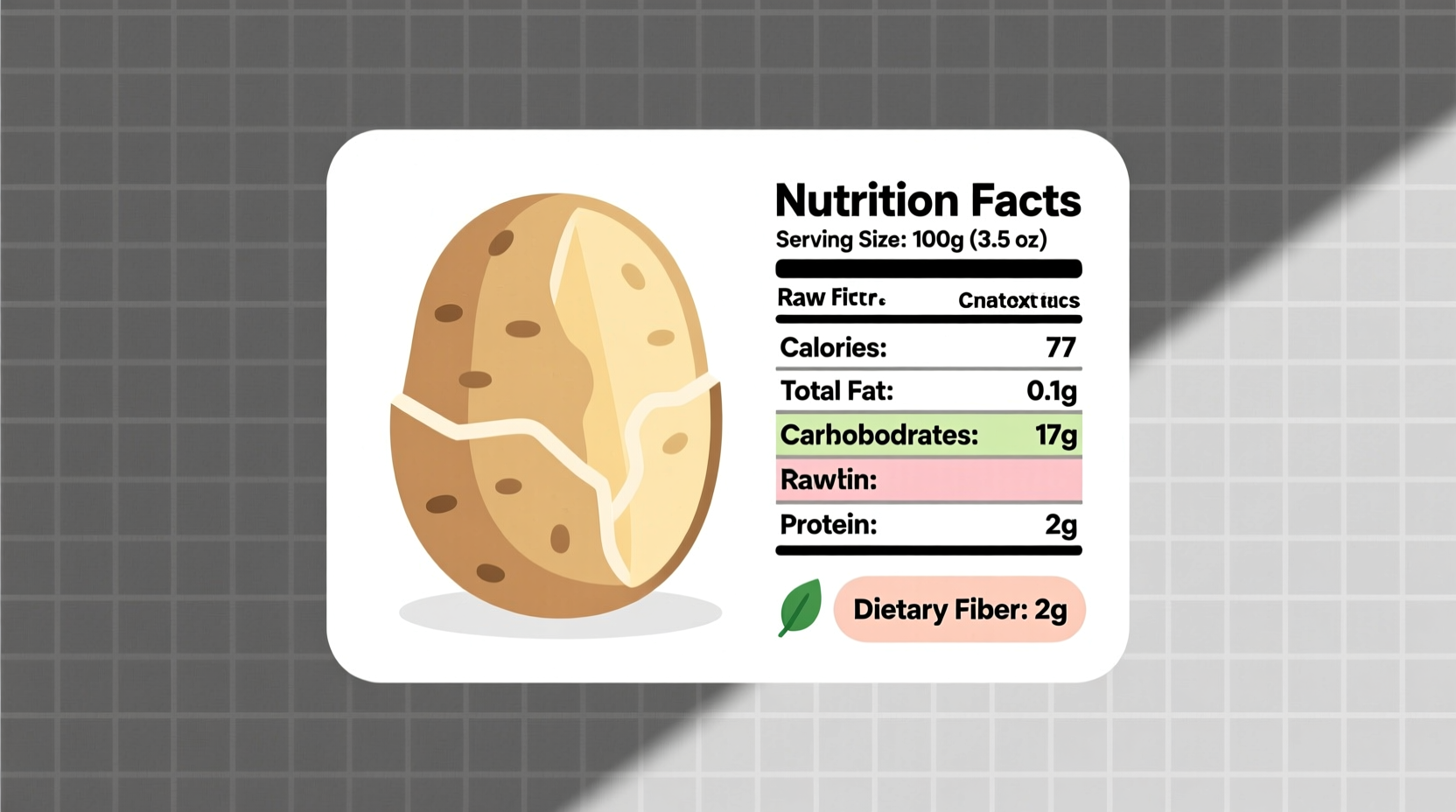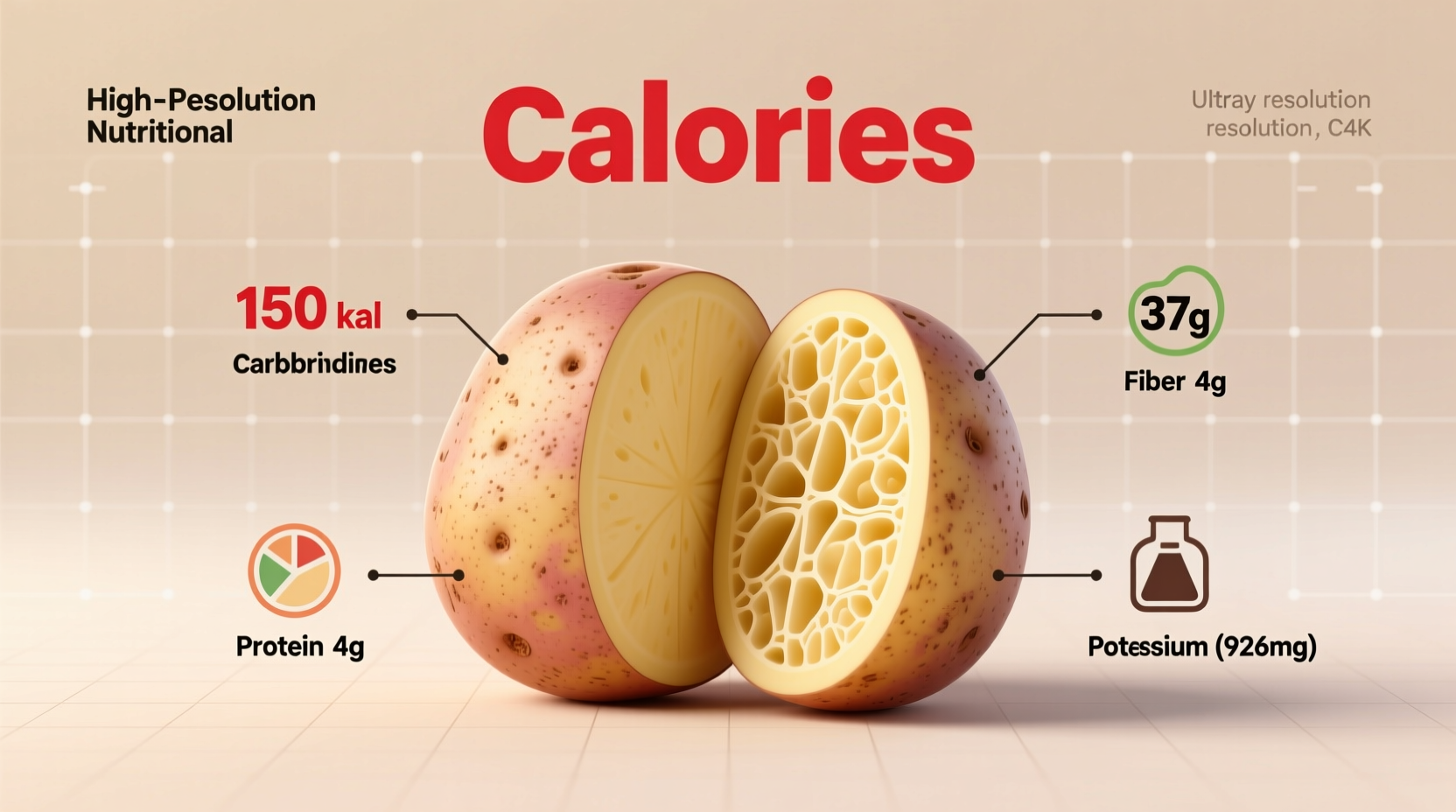Understanding potato nutrition is essential for anyone tracking their dietary intake. Whether you're meal planning, managing weight, or simply curious about this versatile staple food, knowing exactly how many calories are in a potato helps you make informed choices.
Why Potato Calories Vary: Key Factors
Not all potatoes are created equal when it comes to calorie content. Three primary factors determine the final count:
- Size matters most - A small potato (138g) contains about 100 calories, while a large one (369g) can reach 260 calories
- Variety differences - Russet, red, yellow, and sweet potatoes each have unique nutritional profiles
- Preparation method - Cooking technique dramatically impacts final calorie count
Potato Calorie Reference Guide
Based on USDA FoodData Central measurements, here's what you need to know about common potato varieties:
| Potato Type | Size | Calories (with skin) | Calories (without skin) |
|---|---|---|---|
| Russet | Medium (173g) | 168 | 150 |
| Red | Medium (150g) | 130 | 118 |
| Yellow | Medium (156g) | 139 | 125 |
| Sweet | Medium (130g) | 112 | 103 |
This nutritional data comes directly from the USDA's official FoodData Central database, the most reliable source for standardized food measurements in the United States. The variations between potato types might seem small, but they become significant when tracking daily intake.
How Cooking Methods Change Calorie Content
What you do with your potato dramatically affects its final calorie count. Here's how common preparation methods impact the numbers:
- Boiled - A medium potato (156g) contains about 139 calories. Boiling preserves most nutrients while keeping calories low.
- Baked - The same medium potato jumps to 163 calories when baked. The concentration effect from water loss increases calorie density.
- Mashed - With just milk (no butter), 1 cup (215g) contains approximately 200 calories.
- Fried - French fries (3 oz/85g) contain 130-150 calories, while potato chips (1 oz/28g) reach 150-160 calories due to oil absorption.
According to research published in the Journal of Food Composition and Analysis, baking causes a 15-20% increase in calorie density compared to boiling due to water evaporation. This explains why the same potato appears to have more calories after baking - it's not gaining calories, but concentrating them as moisture leaves.

Potatoes in Your Daily Diet: Practical Context
Understanding how potatoes fit into your overall nutrition is crucial. A medium potato provides:
- About 37 grams of carbohydrates (12% of daily value)
- Nearly half your daily vitamin C needs
- Significant potassium (more than a banana)
- 3-4 grams of dietary fiber when eaten with skin
Compared to other common starches, potatoes offer more nutrients per calorie than refined grains. A study from the Harvard T.H. Chan School of Public Health found that when prepared healthily (baked, boiled, or steamed without added fats), potatoes can be part of balanced eating patterns. The key is portion control and preparation method - two factors within your control.
Smart Strategies for Tracking Potato Calories
Accurate tracking makes all the difference. Try these practical approaches:
- Weigh before cooking - Potatoes lose 20-25% of their weight during baking, changing calorie density
- Keep skin on - The skin contains nearly half the fiber and significant nutrients
- Measure additions carefully - One tablespoon of butter adds 100 calories
- Use visual references - A medium potato is about the size of a computer mouse
For those using food tracking apps, remember to specify both potato variety and preparation method. Many apps default to generic values that don't account for these critical differences. The USDA database recommends using specific entries like "Potatoes, Russet, baked" rather than generic "potato" entries for the most accurate tracking.
Putting Potato Nutrition in Perspective
While calorie count matters, potatoes offer nutritional benefits beyond simple energy measurement. Their high potassium content supports healthy blood pressure, and their resistant starch (especially when cooled after cooking) feeds beneficial gut bacteria. The glycemic index varies significantly based on preparation - boiled potatoes have a lower glycemic index than baked ones.
Registered dietitians often recommend including potatoes in moderation as part of balanced meals. As Antonio Rodriguez explains, "Understanding how preparation affects both calorie content and nutrient availability helps you make smarter choices. A baked potato with skin provides more fiber and nutrients than mashed with added fats, but both can fit in a healthy diet when portion sizes are appropriate."
Frequently Asked Questions
How many calories in a small potato?
A small potato (about 138g) contains approximately 100 calories when boiled with skin. The exact count varies by variety, with red potatoes typically having slightly fewer calories than russets of the same size.
Do potatoes lose calories when cooked?
No, potatoes don't lose calories when cooked - the total calorie content remains the same. However, water loss during baking concentrates the calories, making baked potatoes appear higher in calories per gram than boiled ones. A 150g raw potato has the same total calories as when cooked, but the cooked version weighs less, so per-ounce calorie count increases.
Are sweet potatoes lower in calories than regular potatoes?
Generally, sweet potatoes have slightly fewer calories than white potatoes of the same weight. A medium sweet potato (130g) contains about 112 calories compared to 130-168 calories for most white potato varieties. Sweet potatoes also provide more vitamin A, while white potatoes offer more potassium.
How do toppings affect potato calorie count?
Toppings dramatically increase potato calories. One tablespoon of butter adds 100 calories, sour cream adds 60 calories per tablespoon, and bacon bits contribute about 20 calories per tablespoon. A plain medium baked potato (163 calories) can easily exceed 500 calories with generous toppings. For lower-calorie options, try Greek yogurt instead of sour cream and herbs instead of butter.
Can potatoes fit into a weight loss diet?
Yes, potatoes can be part of a weight loss diet when prepared healthily and portion-controlled. Their high fiber and resistant starch content promotes satiety. Research from the University of Washington shows that when prepared without added fats (boiled or baked with skin), potatoes have a high satiety index, helping you feel full longer than many other carbohydrate sources. The key is preparation method and portion size - a medium potato as part of a balanced meal works better than large portions with high-calorie toppings.











 浙公网安备
33010002000092号
浙公网安备
33010002000092号 浙B2-20120091-4
浙B2-20120091-4